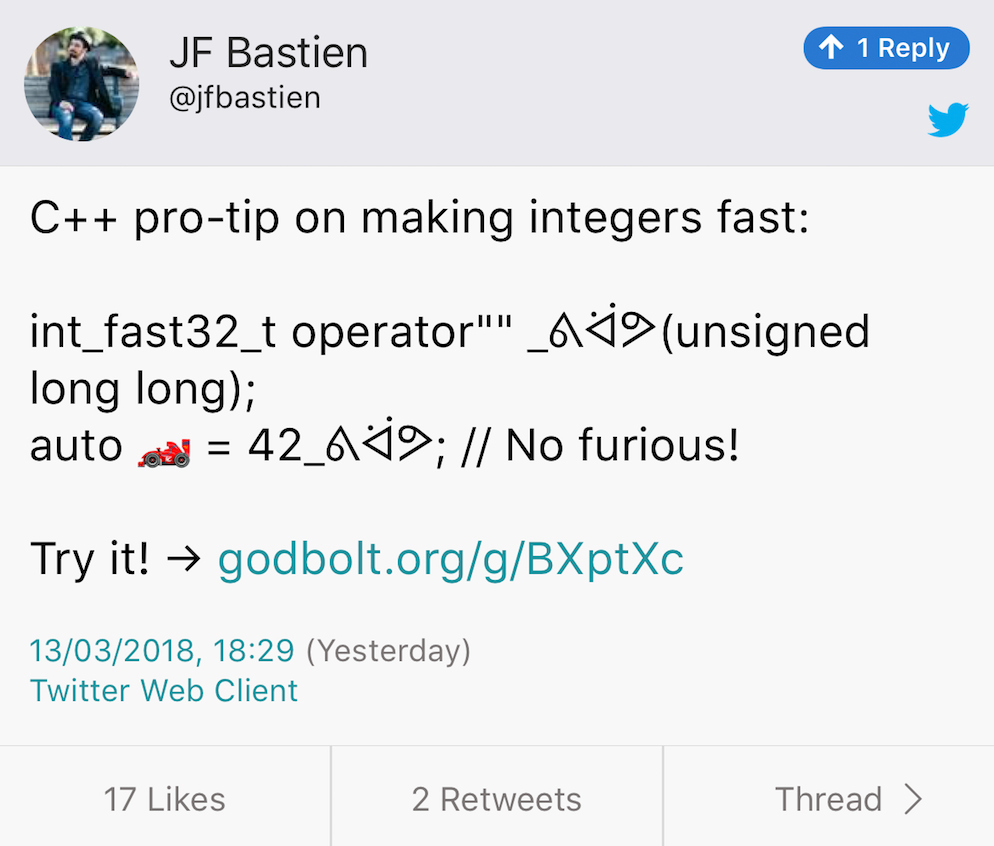Meeting 29 March 2018
Jacksonville C++ Standards Meeting
-
Trip reports
-
The Plan (according to Herb Sutter – Thanks Bjarne):
- Executors: TS in the C++20 timeframe, standard in C++23
- Networking: C++23 (delayed by Executors)
- Coroutines: C++20
- Modules: Partially in C++20 with more in C++23 (blame Google)
- Contracts: C++20
- Reflection: TS in C++20 timeframe, standard in C++23
- Ranges: Core in C++20, cool stuff in C++23
Text Formatting at the ISO C++ standards meeting in Jacksonville
1s = format("{}"_fmt, 42);
1s = format<"{}">(42);
2s = format(fmt<"{}">, 42);
3s = "{}"_format(42);
C++ committee, please look at the big picture
More disappointment as the C++ standardisation process fails to deliver what programmers need….
There have been a lot of improvements but the whole “It must be perfect” ethos rather than 80/20 is really damaging this language and libraries.
Maybe the precious backwards compatibility is more damaging to progress?
Terse Concepts syntax poll
Which concepts terse syntax looks promising and should be adopted by the committee?
- Adjective syntax – 28 (Peter Sommerlad, Jonathan Müller)
- Original syntax – 18 (Yours truly)
{}syntax – 8- No terse syntax is needed – 3 (Bryce Lelbach)
auto<>syntax – 2 (Joel Falcou)
28.03.2018, Distributed C++ meet-up 0x02 - Berlin && London && Stockholm
The RedMonk Programming Language Rankings: January 2018
- JavaScript
- Java
- Python
- PHP
- C#
- C++
GCC8 usability improvements by Red Hat
C++ Study Notes for interview preparation
The Definitive C++ Book Guide and List
#pragma once has unfixable bugs. It should never be used.
If your #include search path is sufficiently complicated, the compiler may be unable to tell the difference between two headers with the same basename (e.g. a/foo.h and b/foo.h), so a #pragma once in one of them will suppress both. It may also be unable to tell that two different relative includes (e.g. #include "foo.h" and #include "../a/foo.h") refer to the same file, so #pragma once will fail to suppress a redundant include when it should have.
The short version of why this is unfixable is that neither the Unix nor the Windows filesystem API offer any mechanism that guarantees to tell you whether two absolute pathnames refer to the same file.
Historical note: The only reason I didn’t rip #pragma once and #import out of GCC when I had the authority to do so, ~12 years ago, was Apple’s system headers relying on them. In retrospect, that shouldn’t have stopped me.
Reddit Q: Monadic error handling
Detecting incorrect C++ STL usage, by Krister Walfridsson
1g++ -O2 -D_GLIBCXX_DEBUG example.cpp
Memory Tagging (aka memory coloring, memory tainting, lock and key) and how it improves C/C++ memory safety
- Every TG (tagging granularity) bytes of memory aligned by TG are associated with a tag of TS (tag size) bits. These TG bytes are called the granule.
- TS bits in the upper part of every pointer contain a tag.
- Memory allocation (e.g. malloc) chooses a tag, associates the memory chunk being allocated with this tag, and sets this tag in the returned pointer.
- Every load and store instruction raises an exception on mismatch between the pointer and memory tags.
- The memory access and tag check do not necessarily occur atomically with respect to each other.
Implementations:
- SPARC ADI: The SPARC ADI hardware extension is supported on SPARC M7/M8 CPUs running Solaris OS. There is also some indication that Linux support is in progress.
- AArch64 HWASAN (hardware-assisted ASAN): an AArch64-specific compiler-based tool.
My favourite C++17 features, by Kacper Kołodziej
- Structured bindings
- Fold expressions
constexpr if- Selection statements with initializer
- Nested namespaces
lvalues, rvalues, glvalues, prvalues, xvalues, help!

Floating point visually explained
Twitter: C++ 9-year cycle

Twitter: Fast integers – Godbolt, StackOverflow

Quote
Oscar Godson:
One of the best programming skills you can have is knowing when to walk away for a while.